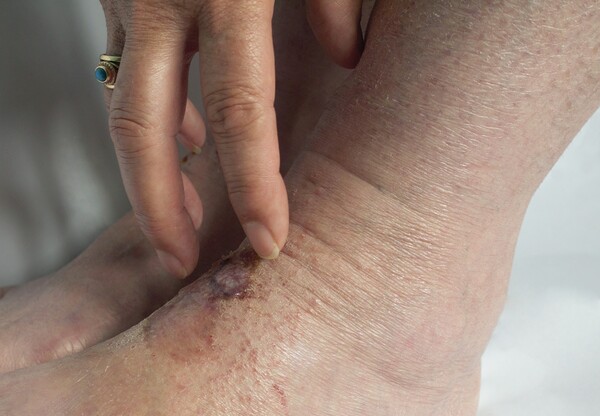Liver disease is often accompanied by itching. It is a little more common in conditions such as post-liver transplantation, primary biliary cirrhosis, intrahepatic cholestasis of pregnancy, chronic hepatitis B, and chronic hepatitis C, and can also occur in neoplastic diseases like primary sclerosing cholangitis and pancreatic cancer, as well as extrahepatic cholestasis. Itching associated with liver disease is related to bile and bilirubin produced by the liver.

“The most important mediators of liver-related itching are bile or bilirubin,” said Professor Lee Dong-hun of the Department of Dermatology at Seoul National University Hospital on the YouTube channel, “Gandeul Gandeul.” “When bile becomes stagnant, the concentration of bile acids in the skin increases. When bile is stagnant or completely blocked, itching can easily occur. Additionally, some people experience severe itching when bilirubin levels in the blood rise."
Of course, even patients with liver disease who have normal bile or bilirubin levels may experience severe itching. "There are cases where patients report severe itching even when bile levels are normal or bilirubin levels are within the normal range,” Professor Lee explained. “This is thought to be due to other itching-inducing substances, such as histamine, serotonin, autotaxin, and substance P. Further research is needed."
Besides, some people experience itching at the surgical site after liver surgery, which has a slightly different cause.
“The reason the surgical site itches is related to the patient's skin characteristics. The wound often protrudes slightly,” Lee said. “In cases of keloids or hypertrophic scars, various immune cells increase in number, particularly mast cells associated with hives or allergies. These cells release histamine and other immune substances, which can trigger itching.”
Another possible reason for itching after liver surgery is believed to be related to neuropathy. “I think it is also related to neuropathy, where even mild stimulation can easily trigger itching,” Professor Lee pointed out.
Can immunosuppressants taken after liver transplantation also cause itching, then? The possibility is considered low, however.
"All medications have some potential for causing itching or drug rashes. If new itching or skin lesions develop, it is necessary to differentiate whether it is due to the medication not being suitable or a drug rash,” Lee explained. “However, some immunosuppressants are used to slightly reduce the immune response of the skin, which is overly active, so the likelihood of severe itching due to these medications is not very high.”
Patients with liver disease experience more severe itching at night, and there is a reason for this. The first reason is that the substances in our bodies that help relieve itching are produced in smaller amounts at night.
“There is something called a circadian rhythm, which is the cycle in which substances such as hormones are released in our bodies. Some substances are released more during the day, while others are released more at night. There are steroid components in our bodies that are related to itching and inflammation, and these components rise slightly in the morning and fall at night, causing anti-inflammatory substances to decrease and inflammation to increase relatively,” Professor Lee noted.
Since the secretion of steroids in the body, which helps alleviate itching, decreases at night during the circadian rhythm, inflammation worsens, causing patients to experience more severe itching at night. "Conversely, substances that trigger itching tend to increase more at night than during the day. At night, various substances increase, skin temperature rises, blood vessels dilate, and the skin barrier weakens, making it easier to feel itchy,” Lee explained.
Itching becomes more severe at night because other stimuli are reduced. “During the day, when you are busy with other things, you may not feel itchy. However, when you lie down quietly at night without such stimuli, itching may occur," he noted.
So, how can liver disease patients escape the itching that causes discomfort and insomnia at night? The answer may lie in keeping the bedroom cool and taking anti-itch medication before bedtime.
"Since elevated skin temperature exacerbates itching, taking long showers with very hot water can damage and weaken the skin barrier itself. It is recommended to keep the room cool and take anti-itch medication before bedtime,” Lee advised.
The itching experienced by patients with liver disease varies depending on the season, often worsening in summer due to sweat and in winter due to dry humidity.
For patients whose condition worsens in summer, the components in sweat act as itch-inducing substances. If you sweat a lot and don't wash, it becomes extremely itchy. In winter, dryness weakens the skin barrier, often leading to itching. It is important to pay more attention to applying moisturizers and to apply them multiple times a day," he said.
When patients with liver disease experience itching, they should refrain from scratching to the point of causing wounds. “Itching is defined as the ‘desire to scratch.’ While scratching may provide temporary relief, vigorous scratching can cause wounds, leading to inflammation and the gathering of immune cells, which in turn triggers the release of itching substances, creating a vicious cycle known as the ‘itch-scratch cycle,’” Lee explained.
"This makes treatment very difficult, and repeated scratching can cause the skin to thicken and develop raised lesions. It is not easy to resist scratching when it itches. In such cases, cooling the skin can help, and oral medications or topical creams may be used as needed. If the itching is caused by liver disease, managing the underlying condition is the most important step," he advised.

